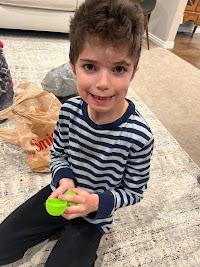Embracing Autism
There’s a leader in my Church who once said “You can have what you want, or you can have something better.”
It was the spring, the temperature outside was perfect, and some dear friends of ours had invited us and our family to an activity where our children would do a bunch of fun activities to experience a little bit of Ukrainian culture. I had been very excited about this event for some time leading up to it, and the day had finally come.
I spent the entire event in my minivan with Samuel throwing one of his classic temper tantrums in the back seat.
Instead of watching my children learn Ukrainian words, eat Ukrainian food, and listen to Ukrainian music, all I experienced was my screaming 7-year-old. This was one of many, many experiences where we just couldn’t participate in an event the way we were hoping. Once again, the crowds, the noise, and the atmosphere was all just too overwhelming for my son to handle.
At this point in time, Samuel had only been officially diagnosed with Autism for a few months, and Malissa and I were on a crusade to understand Autism and help Samuel overcome it. Autism was something we knew very little about, and similar to any “problems” we had encountered in the past, we dove into researching “solutions.”
In an attempt to distract myself from the screeching child in the back seat, I put in my earbuds and pulled up YouTube on my phone. One of my favorite content creators, Mark Rober, had a new video out, one that was unlike any he had published before. This video was about his Autistic son. I watched this video and saw pure joy in the eyes of Mark, his son, and his whole family, while Mark explained just how WONDERFUL it was to have a son with Autism. The video left me feeling bitter and resentful. In anger, I recall banging my fist on the steering wheel and proclaiming, “I don’t want an autistic son, I want a son that can experience Ukrainian culture!”
In that moment in my minivan, I didn’t have what I wanted. I was trying to fix my son. I wanted him to be “normal,” and I thought that through hard work and training and perseverance, eventually he would change and be able to live a “normal” life.
I don’t regret my thoughts or attitude that day in the minivan. Anger and denial are important phases of grief, and are things we all experience. When I look back at that father in the minivan, I look back with fondness. There was a dad who was trying his best. He’s exhausted from trying to take care of four children including a brand-new baby. He’s sleep-deprived and trying to navigating the world of autism, something that is brand new for him, and something he knows very little about.
It was many months after this event that I finally embraced my son for who he is. As I sit and write this post, I can say with confidence that while my son may not be “normal” or “neurotypical,” he is perfect. Every day I get a note from him that always says the same thing: “Dear daddy, I love you, love, Samuel.” And while I read the note out loud, I get to watch him jump for joy and flap his hands as though this was the first note he’s ever given me. I get to snuggle with him on my lap while he does the same sticker book he’s done a dozen times, and watch as he is still so proud of himself any time he completes a page. The list goes on and on, and while there are so many wonderful things I get to experience with my son, the best thing of all is that I get to see the childlike joy in his eyes, the same joy that was there years ago, and the same joy that will be there years from now, as he lives his messy, but perfect, autistic life. Every day with him is a gift, and as I see the joy in his eyes, I discover that joy in my own as well, and I can finally understand what Mark Rober meant when he talked about how WONDERFUL it is to have an autistic son.
That father in the minivan didn’t have what he wanted. Instead he had something much, much better.


Comments
Post a Comment